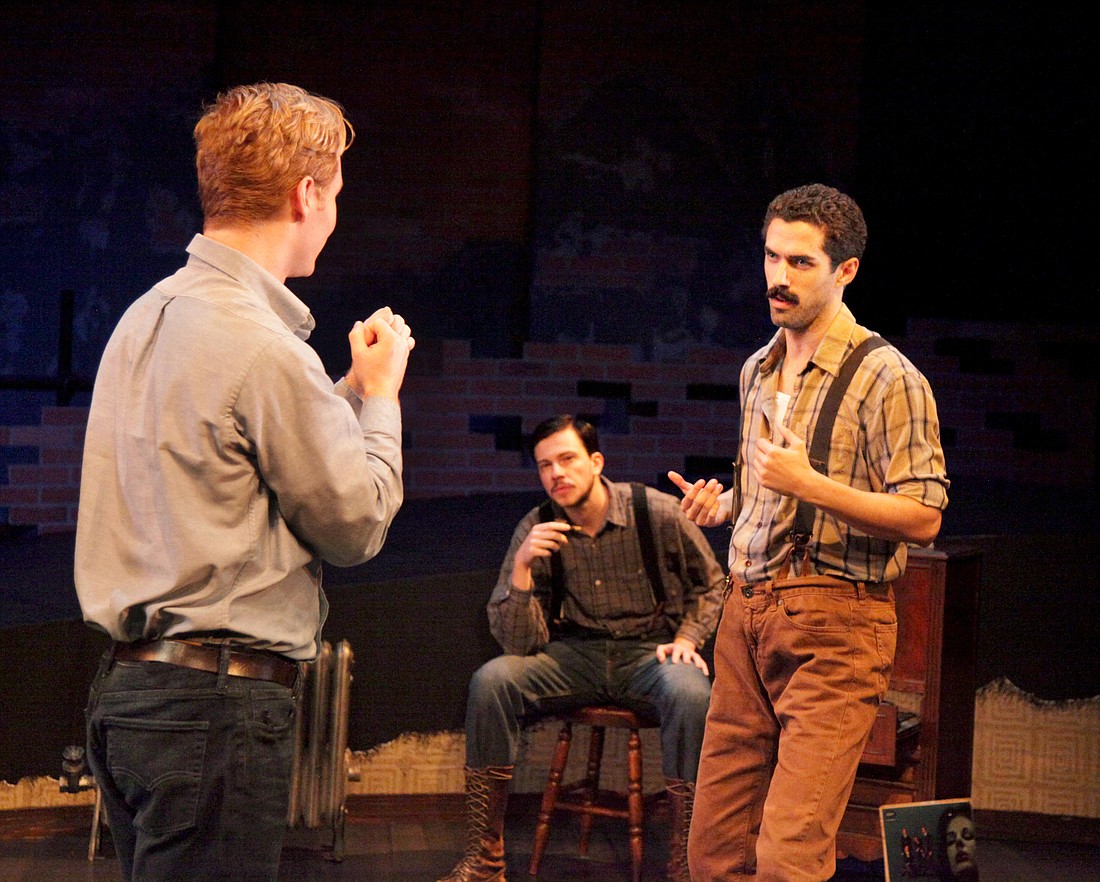- November 5, 2025
-
-
Loading

“A View from the Bridge” offers a skewed perspective on human destiny in The Asolo Conservatory’s latest production. Arthur Miller’s play takes place in a dockside slum in 1950s Brooklyn. A similar setting to Elia Kazan’s “On the Waterfront.” But Miller’s protagonist is a very different rat. And not so sympathetic.
Terry Molloy, the hero of Kazan’s film, faced hard choices. The anti-hero of Miller’s play seems to have no choice at all. He’s as doomed as Oedipus.
The anti-hero in question is Eddie Carbone (Wes Tolman), a longshoreman just like Terry. His wife, Beatrice (Amber Lageman), asks Eddie to open their home to two of her cousins—illegal immigrants from Sicily looking for work. Nice guy Eddie agrees. Marco (Aleksandr Krapivkin) and Rodolpho (Dustin Babin), sleep in the living room; Eddie even gives them his blankets. But this good deed stirs bad blood. After Beatrice’s sister died, the Carbones agreed to raise her daughter, Catherine (Amy Helms). Eddie’s taken a special interest in his niece. Too special. She’s 17 now, and in secretarial school. Eddie objects to her short skirts, high heels and budding independence. When Catherine and Rodolpho fall for each other, Eddie fumes like a possessive, jealous lover—and accuses Rodolpho of scheming for American citizenship via the shortcut of a marriage license. This can’t be real love! Why’s he so sure? Because Rodolpho has blonde hair, sings and dreams of Broadway. Not a normal guy, you know? Marco, Eddie’s bullish brother, doesn’t like this kind of talk. Beatrice doesn’t like the way Eddie looks at Catherine. Eddie spills his fears to his lawyer, Alfieri (Andrew Bosworth). Eddie storms out when his lawyer says he can do nothing. Alfieri knows there will be blood. And there’s nothing he can do to stop it.
I’m leaving out a crucial detail here. A detail the lawyer also omitted. A perfectly legal way of getting rid of Rudolpho. With just one phone call …
Savvy readers can figure out what I’m not saying. A spoiler, OK. But it’s a spoiler-proof play. Alfieri tells you right up front that Eddie is doomed. The play’s dramatic tension is unspoiled by hope. It’s more like watching the Zapruder film. And trying to spot the exact frame when doom arrives …
Director Andrei Malaev-Babel treats the material as an elegy—a post-mortem on a doom occurred. How do you handle a talky play? Malaev-Babel responds by focusing on the words. I wish he’d made the actors move more, but I understand the choice.
The play’s inevitable doom unfolds with great performances. Tolman’s Eddie is ready to jump out of his skin with quasi-incestuous lust and sexually possessive rage. Lageman’s powerless, unloved Beatrice knows exactly what’s going on—and wishes it would all go away. Helms’ Catherine is a sweet kid, but her relationship with her uncle isn’t entirely healthy. Babin is effective as Rodolpho, the obligatory nice-guy love interest. His character pushes Eddie’s homophobic buttons—without being openly effeminate. Babin successfully walks this tightrope of a role. Krapivkin’s Marco is quietly threatening—especially in the scene where he dead-lifts a chair from the floor with one hand. Bosworth plays Alfieri, the lawyer and one-man Greek chorus. A keen vocal delivery, but it’s a thankless task. When it’s exposition time, his character sits in a chair and talks for long stretches. Apart from a few scenes with Eddie, he spends the rest of the time sitting in darkness.
It’s a powerful, disturbing, philosophical play. To put it bluntly, I don’t agree with the philosophy.
It seems Miller wanted to set a Greek tragedy in Brooklyn. He substituted Freudian clockwork for the machinations of capricious gods. But it amounts to the same thing. Oedipus stabs out his eyes. Eddie dies in an alley. No way out. No choice, pal.
In 429 BC that was great theater. In 2017 AD, not so much.
Determinism kills drama. Choice creates the tension that holds us in our seats.
Trendy neurologists may argue that free will is a fiction. For fictional characters, it obviously is. Eddie’s ending is in the script. The paradox is …
Eddie’s fate only matters if it’s not fated.
Different choices, different ending.
A fiction, I know.
Call me crazy, but it’s a fiction I need to believe.
Arthur Miller gave the show away. The Asolo Conservatory puts on a great show anyway. At times it’s a bridge too far. But it’s still worth crossing.
IF YOU GO
“A View from the Bridge”
When: Runs through Jan. 15, at the Asolo Repertory Cook Theatre, 5555 N. Tamiami Trail
Tickets: $14.50 to $29
Info: Call 351-8000.